It’s a grand war. I only hope the next one is half as good. I used to think I could take clay and mold it into the semblance of a living thing. The closer it came to being alive, the greater my glory. The power of life is more than that, Nancy. Life! Life for myself as I control my plane. And then, death. Swift and final. In the squeeze of my fingers.” He chuckles. “You can’t do that with clay, Nancy.”
That’s Richard Dix as Rocky Thorne. In peacetime he was a self-assured up-and-coming sculptor who Nancy (Elizabeth Allan) loved. He had no use for the war, at least on a personal level. He compared the soldiers to lemmings and, humored by her show of patriotism, gently scolded Nancy for being swept up by “all this band-playing and flag-waving and general hysteria.” That Rocky Thorne claimed he was standing by his principals, unwilling to kill his fellow man, but his tone was so smug in this proclamation that he seems more self-absorbed than principled, unwilling to be inconvenienced by anyone’s troubles but his own.
It takes one taste of blood, his own, to turn Rocky into an an ace whose only required fuel is the sight of enemy planes dropping from the sky by his hand. He’s a World War I flier who kills with such single-minded glee that even his own squadron keeps out of his way and talks about him as though he were a monster. This same soldier lie awake his first night with the 65th Aero Squadron, unable to sleep because he’s worried about the possibility of taking another life for the first time that morning. He asks Froggy (Theodore Newton), the more experienced flier bunking next to him, how it feels to shoot a man down. “You better forget to worry about the other guy and start worrying about yourself. Kill or be killed, soldier.”
And that’s how it begins. Simple self-preservation. When Rocky had a plane in his sights for the first time he relents and does not fire. The formerly panicked German flier then swoops up and behind him, filling Rocky’s plane—and Rocky—with blasts of gunfire. At the sight of his own blood something snaps, and Rocky repeats the German’s maneuver shortly before sending the enemy plane plummeting to the ground. But Rocky wasn’t satisfied with self-preservation, nor even killing for the sake of duty. Shortly after landing he asks Froggy, “What’s the record around here for German planes shot down?” Froggy asks if he means the individual or squadron record. “Individual,” Rocky says, of course. Rocky kills for glory.
My archives prove me a big Richard Dix fan, and Ace of Aces is a major part of why. It’s my favorite of any Dix movie I’ve seen. It’s also one of my favorite war films.
Dix himself is a bit weak at the beginning, though the more I watch the film the more I convince myself that he does good work in making his pacifist character not a coward, as I first suspected was the intention, but such an egotist that despite his aligning himself within the morality of the story from the very start—“I just don’t like the idea of killing my fellow man for something I’m quite sure he hasn’t done”—he remains unlikable. The Elizabeth Allan character, Nancy, has to goad him into war service. “You’re yellow,” she tells him. “Yellow as this piece of chalk.” Dix is miffed by this. He closes the windows of his studio on the war parade outside, planning to return to work, but distracted. I’m not sure if Rocky knows whether he’s scared or not. That’s Dix, but despite gifting Rocky this bit of humanity, intentional or not, his character is still too pompous and entitled for the viewer to really get behind.
By the time Rocky meets up with Nancy again, when he’s on leave in France where she also serves as a nurse, he has completely overhauled himself into a self-obsessed killer. Prior to their meeting Nancy has heard legend of this new Rocky. Her letters had gone unanswered, but through two injured soldiers from Rocky’s squadron Nancy learns of Rocky’s exploits in the sky. She appears stunned and saddened by the news of what he’s become. Two nurses she rooms with marvel over Rocky when they see his picture splashed over the front page of the paper. They ask Nancy about him and she says she knew him long ago and, fibbing, not very well.
A convenient chance meeting bring Rocky and Nancy together again. Both have changed. She’s uncomfortable alone with him, and he’s pushing Champagne on her to ease her nerves. She mistakes his ogling for a compliment, thinking of the old Rocky and being charmed by him. She asks if it isn’t too late to begin anew. “It’s a new deal, with the aces wild,” Rocky tells her, grabbing her in his arms and planting an unwanted kiss.
Rocky gives that speech at the top of the page, his eyes glazing over as he thanks her: “This is a great war and I’m having a grand time,” he says. “Boy, I wouldn’t have missed this for anything,” and, “You did me a great favor that day in the studio.”
Nancy looks broken throughout their entire meeting. Still, she had hoped to spend the evening catching up with him. His response is blunt: “I can’t afford to waste my time holding hands under the table making small talk with some nice girl from back home.” He has a 48-hour leave and wants to make the most of it. He’s perfectly willing to spend that precious time with her, as long as she understands how that time’s meant to be spent. She’s repelled by his kiss, begs him off, but then he throws back in her face the very words that she had chided him with back in his art studio:
This is no time for scruples. Moral scruples. Everyone must make his sacrifice now. What are you in the face of the suffering of the world? How can you refuse whatever you have to give?
Crushed at what Rocky has become she gives in to him. She created the monster. She cannot allow her own morality to refuse him what he feels is rightfully his. She goes limp in his arms.
Rocky spends the rest of the movie downing Germans and collecting medals, the accolades piling up for a character whose moral code crumbles with each new honor. Even his comeuppance, which comes timed with a brand new opportunity, cannot temper his ego enough to bring Rocky full circle. It takes time away from the glory of battle for him to wonder: “I knew the answer once … why did I forget?” It doesn’t take much for him to forget all over again. Unfortunately, this leads to a sudden ending to the movie, already hampered by that somewhat confused opening.
Richard Dix can be awkward, but once Rocky turns himself into the ace of aces, he’s perfect for the part, both in look and manner. Gritting his teeth and squinting at his prey below, the war is sport for remorseless Rocky, who becomes as wild as the growing lion he’s chosen as his personal mascot. Dix’s face fits this part. The beautiful Elizabeth Allan was borrowed from MGM for this film, probably because she had worked well with Dix and director J. Walter Ruben in No Marriage Ties earlier in 1933. Ralph Bellamy plays Dix’s commanding officer, a largely thankless part that any actor could have handled. Frank Conroy, as Wentworth, outranks Bellamy and has a greater appreciation of Rocky’s fighting skills. Theodore Newton is Froggy, the flier Rocky bunks next to and the most visible of his squadron. The other fliers provide some color, but not as much as their collection of animal mascots. Beyond Dix and Allan all of the other players are only incidental to the story.
Seven years later, after Richard Dix had returned to RKO from Columbia, he appeared in Men Against the Sky, a sort of unofficial sequel to Ace of Aces. He’s an entirely different character in the later movie, but a veteran flier who twenty years after the war ended is recalled as the “Ace of Aces” on barnstorming tours. It and the earlier RKO entry The Lost Squadron (1932) both offer valid scenarios of life after war for Dix’s fliers.
My thanks to Warner Archive for providing a review copy of their manufactured-on-demand DVD-R of Ace of Aces – Pick up your copy here. All accompanying screen captures were grabbed from my copy of that Warner Archive disc.

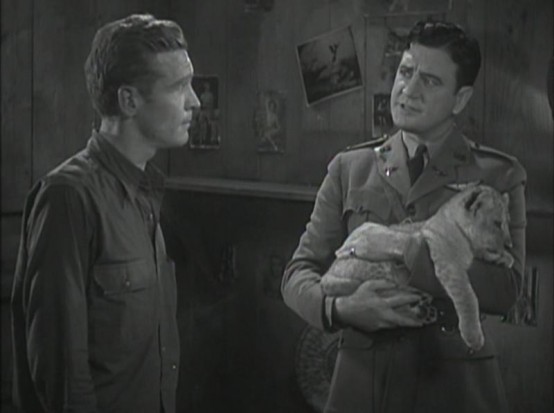

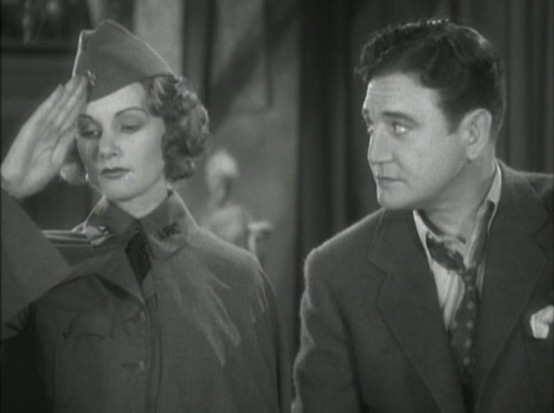

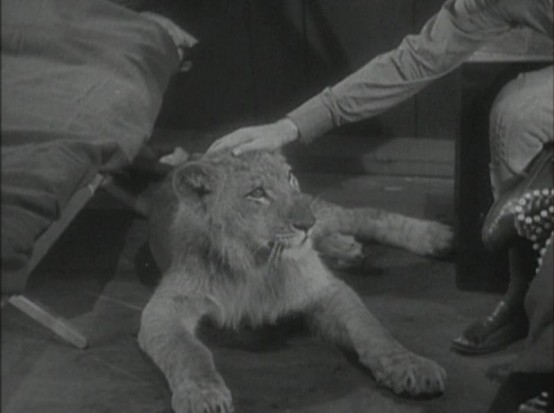

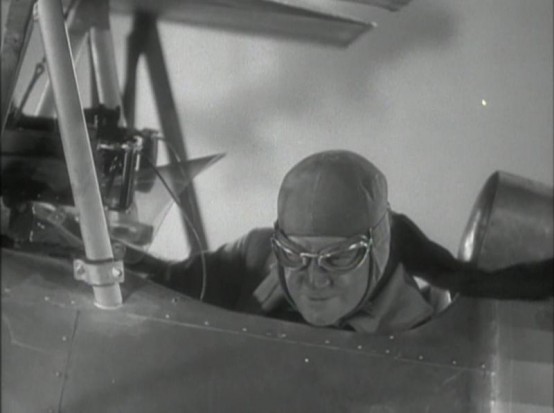
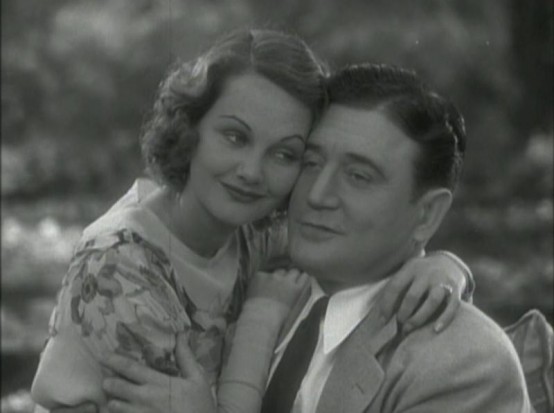

I think this is an anti-war film (appropriate in the 30s when the Kellogg-Brian Pact outlawed war).
Far from Dix being “so smug in this proclamation that he seems more self-absorbed than principled, unwilling to be inconvenienced by anyone’s troubles but his own,” I think he’s making the pacifist case.
His girlfriend has no rational case to make for the war, only motivating him with her taunt. She gets her punishment for being a witch when she loses her virginity to him.
Later Dix becomes a War Lover (a la John Hersey), and Ralph Bellamy (as his CO) is left to voice the anti-war sentiment, though rather weakly because the “cadet” Dix shoots down could soon become a menace.
When Dix (who would have been grounded long before for defying orders and going up alone) hesitates at killing the enemy, he’s shot down…but walks away from the crash.
The film has beautiful shots of plane crashes. Only its short length and abrupt transitions keep it from being great,
Hi Don,
I absolutely agree it’s an anti-war film and I agree that may be the intention with Dix, but by my eyes either he plays it badly and doesn’t get that across clearly, or he plays it brilliantly and makes his character even more complicated: I prefer to think the latter, as it adds some issue of class to the story as well. Nancy’s appeal to the war was common once we were in; there was a war fervor, which by 1933 is supposed to play as ironic. Getting her punishment is one way to put it, I saw it more as paying her price, making good on what she felt was her responsibility for turning Dix into what he’d become (probably the same point, in different words). Agree on Dix, his multiple defiance of Bellamy a bit over the top. And you’re right about him coming full circle in the end (I was trying not to spoil the end up top in the main review); I really like how we think he’s come full circle before that, but his fellow fliers egg him back into action with taunts of the new young ace eclipsing his record. It was nice that Dix wasn’t ready yet, that they didn’t just totally flip a switch on the character. I think we’re largely in agreement on everything here, except whether or not Dix’s smugness, as I termed it, was intentional or just how I read the character.
Thanks for reading and comment–very glad you enjoy this movie, it’s a favorite of mine as well!
Cliff
What an excellent post. I highly enjoyed reading this. Thank you for sharing.
I would also like to invite you to participate in my upcoming blogathon in August. The link is below with more details.
https://crystalkalyana.wordpress.com/2015/06/30/in-the-good-old-days-of-classic-hollywood-presents-the-barrymore-trilogy-blogathon/
Thanks for the invitation.
I don’t have a film blog, just comment from time to time on what I’ve seen.
Certainly Lionel is at the top of character actors of his era, along with Frank Morgan.
Thanks for the invite and the kind words on the post. I won’t be able to contribute this time around, but will keep my eyes open for posts on Twitter.